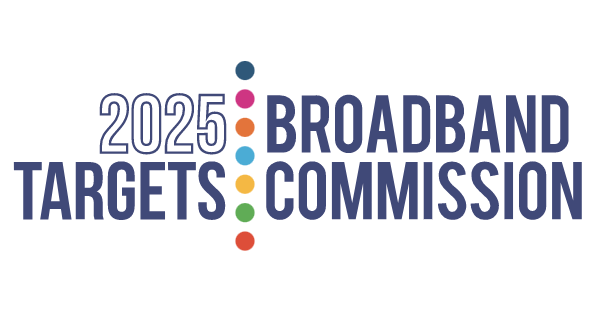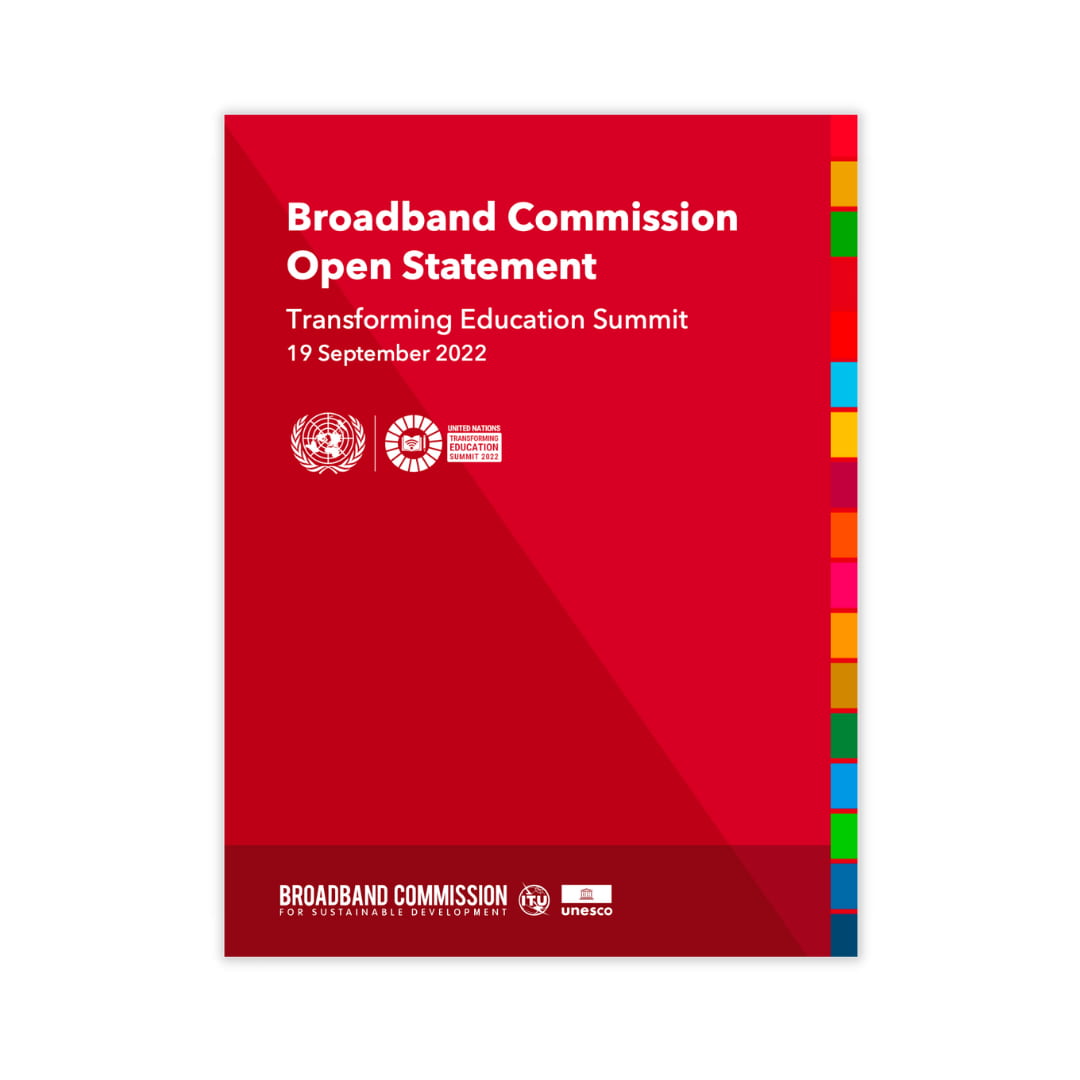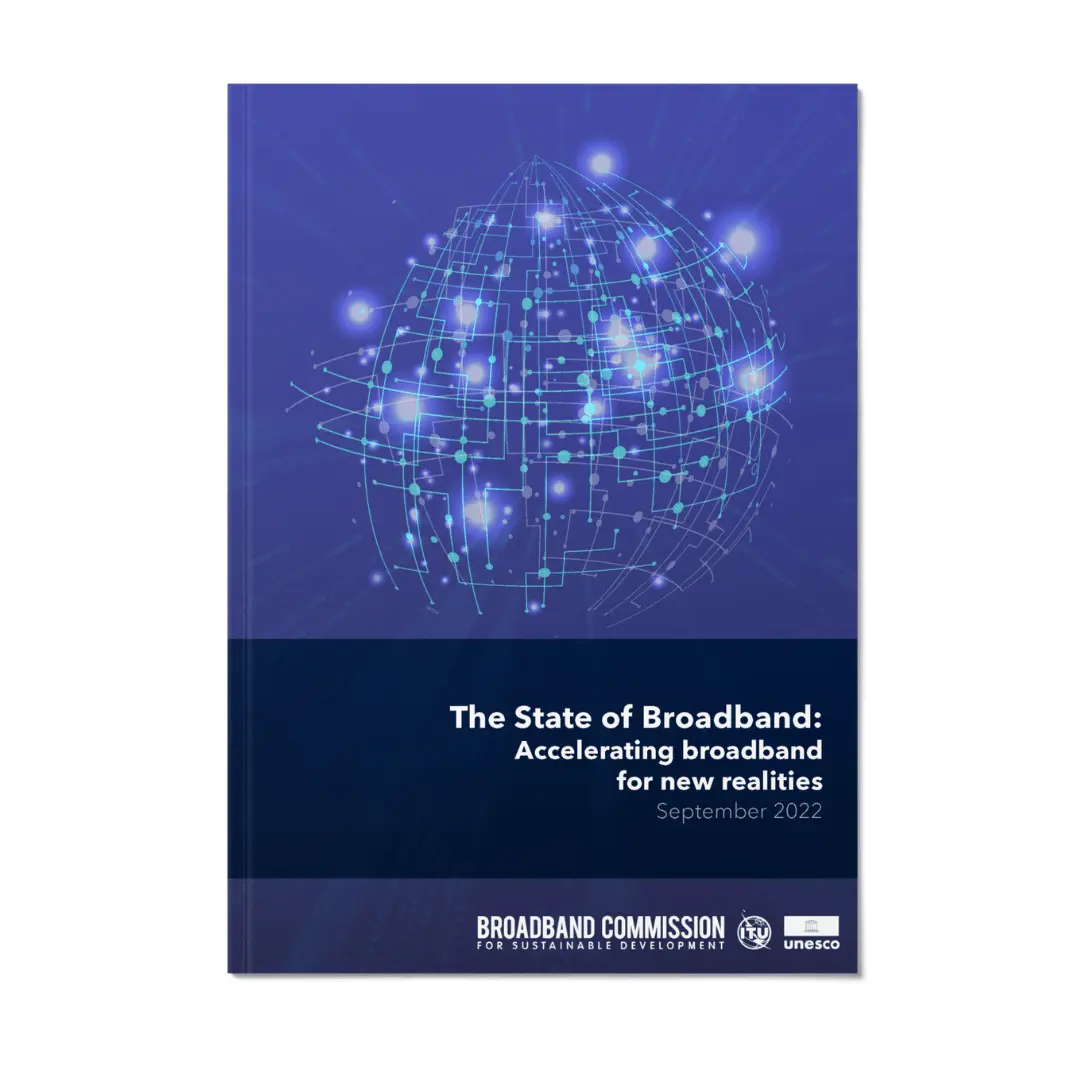Commissioners address pandemic-driven realities and review next steps for meaningful universal connectivity
Originally published on itu.int
New York, 18 September 2022
Digital technologies should form the foundation of education and skills-building as communities continue to adapt to the realities brought on by the COVID-19 pandemic, according to the Broadband Commission for Sustainable Development, which met on Sunday at its annual fall meeting.
The Broadband Commission, made up of public and private sector leaders, makes policy recommendations centered around broadband connectivity to accelerate progress toward achieving the UN’s 2030 Agenda for Sustainable Development.
At the New York meeting, the global technology and development body also emphasized the need for public-private cooperation to develop national strategies to enhance digital skills and advance school connectivity.
“We have made significant progress globally in ensuring universal access to broadband continues to improve, but much remains to be done,” said Paula Ingabire, Rwanda’s Minister of Information Communication Technology and Innovation representing Rwandan President Paul Kagame, Co-Chair of the Commission. “The mission of the Broadband Commission still rings as relevant today as when it was first formed. We must continue to strive for universal access to meaningful, safe, secure, and sustainable broadband communications services that are reflective of human and children’s rights. Public-private partnerships continue to be a key tactic towards enabling us to achieve this objective.”
Advocacy targets aimed at broadband development
To mobilize efforts to achieve universal connectivity–the international aim to connect all of humanity to the Internet—the Broadband Commission puts broadband connectivity at the forefront of global policy discussions. The Commission’s “2025 Advocacy Targets“ focus on providing policy and programmatic guidance for national and international action in broadband development.
About 2.7 billion people— one-third of the global population—still lack access to the Internet, with even fewer people enjoying reliable broadband access, according to the latest statistics from the International Telecommunication Union (ITU).
With only three years left to meet the Commission’s set of seven targets, the fall meeting set out to address the remaining gaps for reaching universal broadband connectivity.
“The successful expansion and rapid adoption of high-speed connectivity experienced over the recent decades, and especially over the last two years of the pandemic, has been transformative for our daily lives, societies and economies,” said Commission Co-Chair Carlos Slim. “Digital services that have proven so essential during this crisis are however still out of reach, too expensive or complicated to use for too many people around the world.”
Technology’s role in education
During the meeting, convened ahead of the U.N.’s Transforming Education Summit at the opening of the 77th Session of the U.N. General Assembly, the Commission called for universal, inclusive and affordable connectivity for the digital transformation of education.
“Accelerating broadband for the new realities of a rapidly changing world is as important as it is timely,” said Catherine M. Russell, Executive Director of UNICEF and a Commissioner of the Broadband Commission, who hosted the meeting. “Three years since UNICEF and ITU launched the Giga initiative
with this group of Commissioners, we have connected more than 2 million children to the Internet. However, the global learning crisis remains real and the pandemic has made it worse. The Transforming Education Summit is a rare opportunity to drive new commitments and investments in innovation so we can reach every child.”
Smaller businesses can make big contributions
The meeting also explored innovative approaches to increasing affordability of access to digital services and devices—including for home-based work and learning—with a focus on micro, small and medium-sized enterprises (MSMEs) and the most vulnerable populations. The approaches examined considered the current economic environment.
“I am pleased that MSMEs are featured prominently in this year’s State of Broadband report,” said ITU Secretary-General Houlin Zhao, a Co-Vice Chair of the Commission. “Innovation does not come just from big industry. Startups and entrepreneurs make vital contributions in this area, and we should continue to work toward ensuring greater participation from small business throughout ITU’s work.”
A forum for multistakeholder engagement
More than 40 Commissioners and representatives attended the Broadband Commission meeting comprising government leaders, as well as heads of international organizations, private sector companies, civil society and academia. Special guests also attended, including Amandeep Singh Gill, UN Envoy on Technology, and Rabab Fatima, UN Under-Secretary-General and High Representative for the Least Developed Countries, Landlocked Developing Countries and Small Island Developing States (UN-OHRLLS).
Among other topics, participants discussed how connectivity and technological innovations are enabling swift adaptation to hybrid education; empowering learners through open education resources and data; building capacities of civil servants for effective digital transformation; and providing platforms for strengthening the literacy necessary for navigating digital spaces.
State of Broadband Report 2022
At the meeting, the Broadband Commission launched its annual State of Broadband Report, focusing on the shifting realities of the pandemic era.
According to the report, COVID-19 sparked a surge in Internet use, but challenges to universal connectivity remain. The report also explores four principal barriers to achieving universal connectivity: lack of skills, lack of access, lack of devices, and a lack of the means to pay for necessary equipment.
Addressing the persistent digital divide and meeting the Commission’s advocacy targets requires strategies, policies and a conducive regulatory environment, says the report. That environment should encourage affordable, meaningful, safe and inclusive broadband services, and it should attract the large investment that is needed.
“The need for greater access to broadband that is fit for purpose in this new world has never been more urgent,” said Doreen Bogdan-Martin, Director of ITU’s Telecommunication Development Bureau and Executive Director of the Commission, “we need the right regulatory environment and the right strategies and policies.”
Commissioners leading working groups on Smartphone Access and AI Capacity Building presented findings and recommendations of their final reports. The preliminary findings of the interim discussion paper of the Working Group on Data for Learning were also introduced.
During the meeting, Mr. Zhao, whose second term as Secretary-General at ITU ends this year, was presented with a certificate of appreciation for his commitment to bringing broadband to the top of the global policy agenda and to supporting digital cooperation for reaching universal connectivity.
Note to editors
Founded in 2010, the Broadband Commission promotes a multi-stakeholder approach to digital cooperation by seeking to align Internet and connectivity growth to achieving the UN Sustainable Development Goals (SDGs). The Commission is recognized for the publication of the annual State of Broadband Report and more than 30 thematic research and advocacy reports addressing such topics as digital health, education, online safety and inclusion of vulnerable populations.
About the Broadband Commission for Sustainable Development
The Broadband Commission for Sustainable Development was established in 2010 by ITU and UNESCO with the aim of boosting the importance of broadband on the international policy agenda and expanding broadband access in every country as key to accelerating progress towards national and international development targets. Led by President Paul Kagame of Rwanda and Carlos Slim Helù of Mexico, it is co-chaired by ITU’s Secretary-General Houlin Zhao and UNESCO Director-General Audrey Azoulay. It comprises over 50 Commissioners who represent a cross-cutting group of top CEO and industry leaders, senior policymakers and government representatives, and experts from international agencies, academia and organizations concerned with development. Learn more at: www.broadbandcommission.org
About ITU
The International Telecommunication Union (ITU) is the United Nations specialized agency for information and communication technologies (ICTs), driving innovation in ICTs together with 193 Member States and a membership of over 900 companies, universities, and international and regional organizations. Established over 150 years ago, ITU is the intergovernmental body responsible for coordinating the shared global use of the radio spectrum, promoting international cooperation in assigning satellite orbits, improving communication infrastructure in the developing world, and establishing the worldwide standards that foster seamless interconnection of a vast range of communications systems. From broadband networks to cutting-edge wireless technologies, aeronautical and maritime navigation, radio astronomy, oceanographic and satellite-based earth monitoring as well as converging fixed-mobile phone, Internet and broadcasting technologies, ITU is committed to connecting the world. For more information, visit www.itu.int.




